8 Recommended AI Courses for Logistics Engineers in 2025
Discover top AI courses tailored for logistics engineers in 2025, enhancing skills in automation, data analytics, and supply chain optimization. Elevate your career with cutting-edge knowledge from leading institutions and industry experts.

The integration of artificial intelligence (AI) into the logistics sector is no longer a future possibility but a present reality. As AI technologies rapidly advance, the need for Logistics Engineers to enhance their skills and knowledge in this area becomes increasingly urgent. Upskilling in AI not only equips professionals with the tools to improve efficiency and productivity but also safeguards their careers against the evolving job market, where AI-driven roles are becoming more prevalent. The potential impact on job functions and opportunities is significant, making AI expertise a critical asset for Logistics Engineers aiming to stay competitive and relevant.
Why AI matters for Logistics Engineers today
AI matters for Logistics Engineers today because it directly influences how businesses optimize operations, reduce costs, and improve speed and accuracy in logistics processes. According to recent statistics, 69% of businesses have already integrated AI into their operations, underscoring the widespread adoption of this technology. The logistics sector, in particular, stands to benefit greatly from AI applications, which can streamline complex supply chain operations. This article aims to assist Logistics Engineers in identifying the best AI courses to enhance their skills, focusing on eight comprehensive programs designed to meet the specific needs of professionals in this field.
The Growing Role of AI in Logistics Engineers
AI applications in logistics cover a variety of areas, including automation of routine tasks, enhancing decision-making processes, and providing personalized solutions that cater to specific logistics demands. Automation helps in reducing human error and increasing efficiency, while AI-driven decision-making tools can analyze vast amounts of data to optimize supply chain management. Additionally, AI offers personalization capabilities that allow logistics operations to tailor their services to client demands. These applications are reshaping tasks and workflows, making the logistics field more adaptive and efficient.
Benefits of becoming an AI expert in Logistics Engineers
For a Logistics Engineers professional, becoming proficient in AI offers numerous benefits. It enables individuals to lead initiatives that leverage AI for improved logistics operations, from inventory management to transportation optimization. AI expertise empowers professionals to reduce operational costs and enhance service levels, all while ensuring a competitive edge in a technology-driven market. Furthermore, knowledge of AI can open up new career pathways and opportunities for leadership roles within the logistics industry.
This article explores eight AI courses tailored for Logistics Engineers, including the CompleteAI Training. These courses provide comprehensive insights and training necessary for professionals to excel in applying AI to logistics challenges. Each program offers unique benefits and learning experiences, ensuring that Logistics Engineers can find a course that aligns with their specific career goals and professional development needs.

Comparison: All AI Courses for Logistics Engineers (Updated Q2' 2025)
| Course Name | Provider | Price | Key Topics | Pros | Cons | Best For |
|---|---|---|---|---|---|---|
| AI for Logistics Engineers | CompleteAI Training | $29/month (monthly subscription), $8.25/month billed annually | Video courses, certifications, AI tools, industry news | Highest rating, extensive range of courses, daily updates, affordable pricing | Subscription based, continuous learning required | Logistics Engineers professionals looking for complete training |
| MS in Enterprise Logistics Engineering (Online) with Focus on Applied AI | Florida International University (FIU) | Not specified | Technical engineering, AI-focused coursework, Microsoft AI certifications | Strong focus on applied AI, flexible online delivery, industry-recognized certification | Coming soon, tuition details not specified | General learners |
| Generative AI Application for Supply Chain Professionals | Supply Chain and Logistics Institute, Georgia Institute of Technology | $1,500 | GenAI concepts, prompt engineering, inventory systems, route optimization | Hybrid delivery, practical applications, covers ethical AI use | Course fee consideration, requires commitment to format | General learners |
| Logistics Management and Artificial Intelligence (AI) | British Academy For Training & Development (BATD) | $2,980,$4,800 | Demand forecasting, inventory optimization, Industry 4.0, IoT | Comprehensive coverage, global availability, focus on current and future technologies | Relatively high cost | General learners |
| Digital Supply Chain Optimization (Short Course) | Indepth Research Institute | $500,$5,000 | AI, big data, analytics, supply chain optimization | Targeted skill development, quick upskilling | Limited hands-on experience | General learners |
| Certified Supply Chain Professional (CSCP) | APICS/ASCM | $1,000,$3,000 | End-to-end supply chain management, logistics strategies, AI and automation | Widely recognized certification, comprehensive coverage | May require prior logistics experience | General learners |
| Certified in Logistics, Transportation, and Distribution (CLTD) | APICS/ASCM | $1,000,$3,000 | Logistics operations, AI-driven logistics solutions | Specialized focus, globally recognized certification | Requires preparation, challenging for beginners | General learners |
| Specialized Courses in AI and Automation in Logistics | Various (Indepth Research Institute and partners) | $500,$5,000 | AI-driven logistics, automation, predictive analytics | Prepares for future trends, enhances efficiency | Availability depends on provider, may require technical background | General learners |
Understanding AI Training for Logistics Engineers Professionals
The integration of Artificial Intelligence (AI) in logistics is transforming the field, making it crucial for logistics engineers to enhance their skills with AI expertise. A variety of courses are available to meet the diverse needs of professionals at different stages of their career. This article provides a detailed comparison of several AI courses designed specifically for logistics engineers, each offering unique benefits and learning experiences.
Course 1: CompleteAI Training
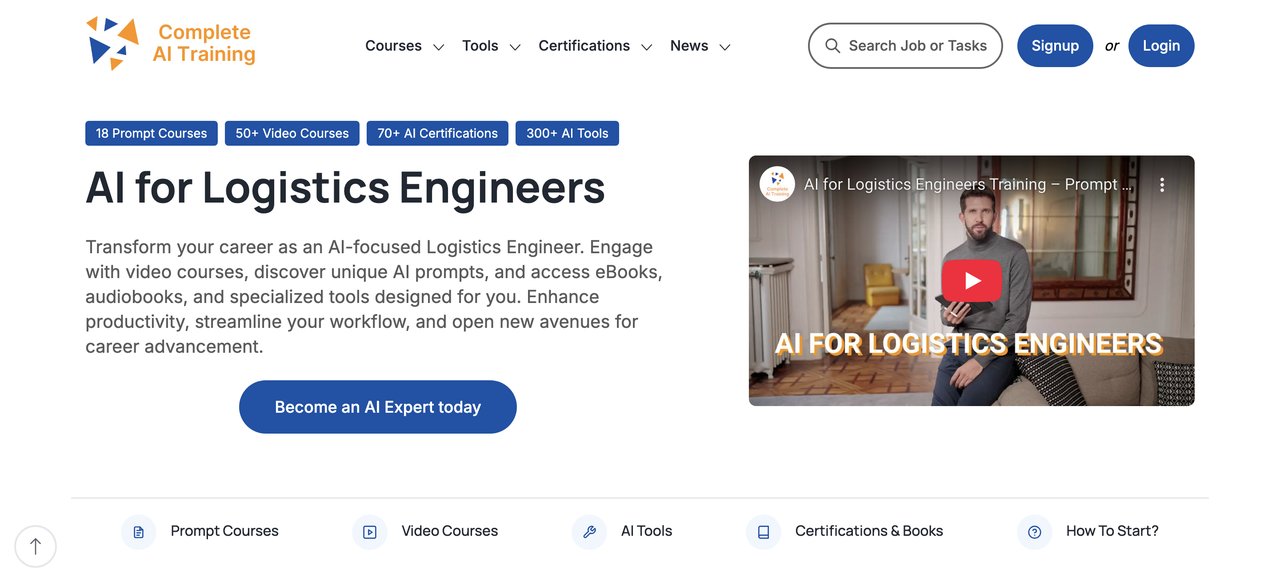
CompleteAI Training offers an extensive library of over 100 video courses and certifications specifically tailored for logistics engineers. The platform provides comprehensive AI education, daily updates on AI tools, and curated industry news. This subscription-based service is cost-effective, with a monthly fee of $29 or an annual rate of $8.25 per month.
Key Topics Covered: AI tool updates, logistics-specific AI applications, certifications in AI for logistics.
Target Audience and Skill Level Requirements: Suitable for logistics engineers seeking continuous learning in AI.
- Pros:
- Highest rating and most complete offering.
- Daily updates on AI tools and industry news.
- Affordable pricing, especially with annual billing.
- Cons:
- Subscription-based model requires ongoing payment for access.
Who Would Benefit Most: Professionals committed to continuous learning and staying updated with the latest AI trends in logistics.
Visit CompleteAI TrainingCourse 2: MS in Enterprise Logistics Engineering (Online) with Focus on Applied AI by Florida International University (FIU)
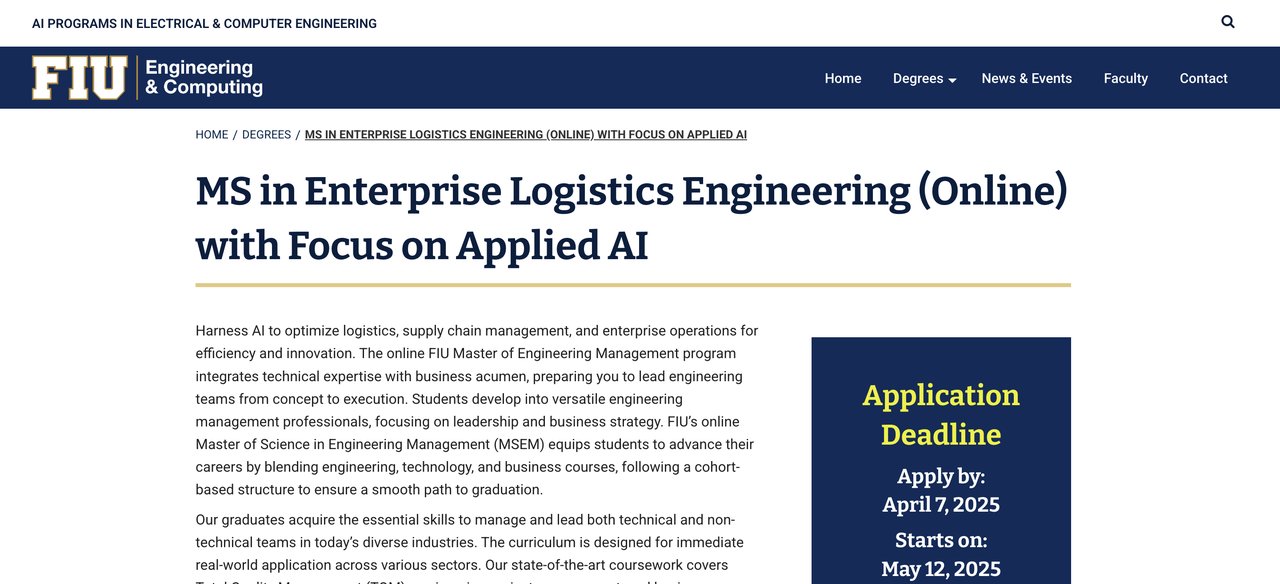
This upcoming online master's program is designed for logistics engineers who aim to leverage AI in logistics, supply chain management, and enterprise operations. The curriculum integrates engineering, business leadership, and AI-focused coursework, including machine learning and cloud computing.
Key Topics Covered: Machine learning, deep learning, generative AI, engineering management.
Target Audience and Skill Level Requirements: Aimed at professionals seeking advanced education in AI within logistics.
- Pros:
- Strong focus on applied AI in logistics.
- Flexible online delivery.
- Industry-recognized certification preparation.
- Cons:
- Program is 'Coming Soon' with limited initial availability.
- Tuition and fees not explicitly detailed.
Who Would Benefit Most: Logistics engineers interested in a formal academic approach to AI in logistics.
Visit FIU's ProgramCourse 3: Generative AI Application for Supply Chain Professionals by Georgia Institute of Technology
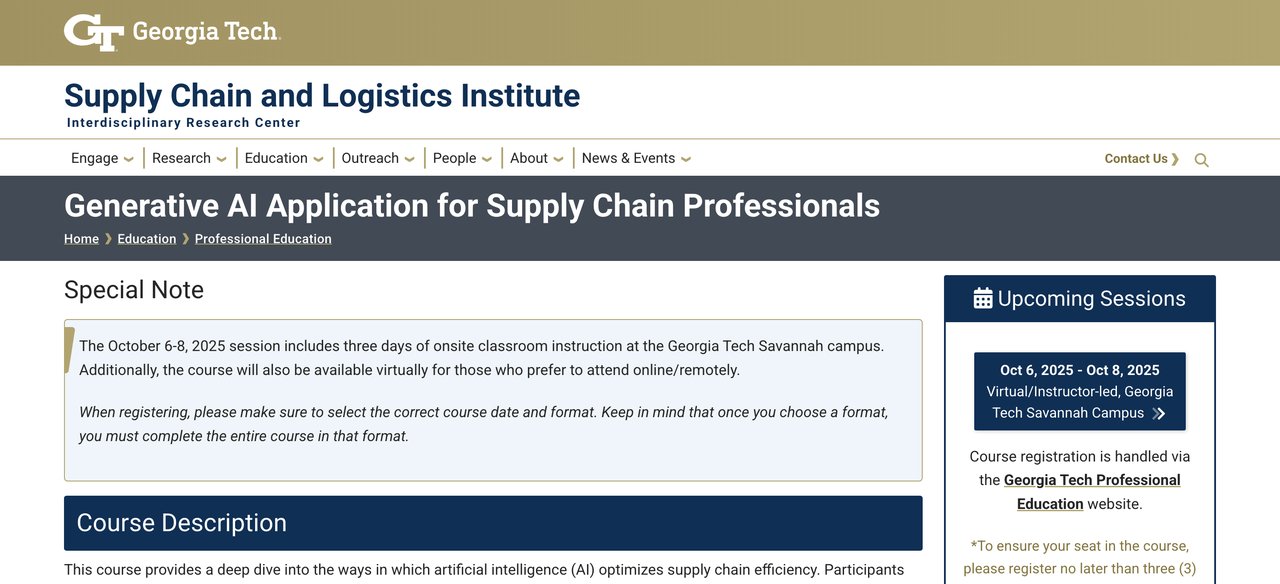
This hybrid course explores how generative AI can optimize supply chain efficiency. It covers foundational GenAI concepts, automated inventory systems, and predictive maintenance. The course is designed for logistics engineers and supply chain professionals seeking practical AI skills.
Key Topics Covered: Generative AI, prompt engineering, route optimization, ethical AI use.
Target Audience and Skill Level Requirements: Suitable for both AI novices and those with some AI knowledge.
- Pros:
- Hybrid delivery offers flexibility.
- Practical, hands-on AI applications.
- Covers ethical and strategic aspects of AI adoption.
- Cons:
- Course fee may be a consideration for some.
- Requires commitment to full course format.
Who Would Benefit Most: Professionals looking for practical AI applications in supply chain management.
Visit Georgia Tech's CourseCourse 4: Logistics Management and Artificial Intelligence (AI) by British Academy For Training & Development (BATD)
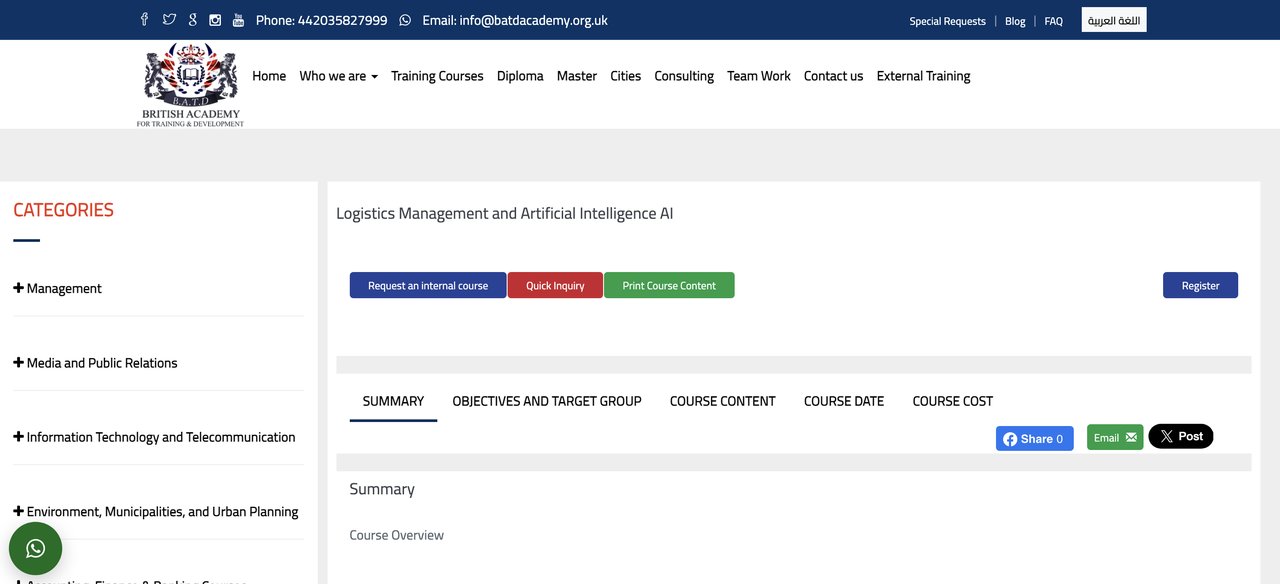
This comprehensive course focuses on AI integration in logistics, covering demand forecasting, inventory optimization, and more. It's suitable for logistics engineers, managers, and supply chain professionals.
Key Topics Covered: Demand forecasting, route and fleet management, future trends like Industry 4.0.
Target Audience and Skill Level Requirements: Designed for professionals with a focus on current and future AI technologies in logistics.
- Pros:
- Comprehensive coverage of AI applications in logistics.
- Balance of practical and theoretical content.
- Global availability with sessions in major cities.
- Cons:
- Relatively high cost depending on group size and location.
Who Would Benefit Most: Logistics professionals seeking comprehensive coverage of AI applications.
Visit BATD's CourseCourse 5: Digital Supply Chain Optimization (Short Course) by Indepth Research Institute
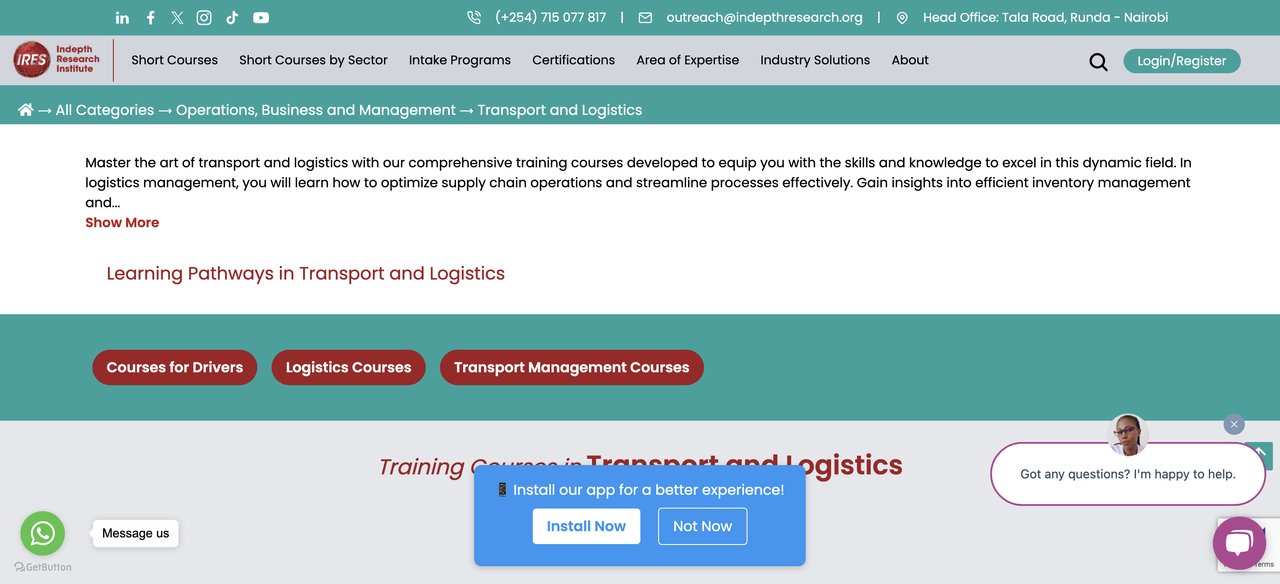
This short course focuses on AI, big data, and analytics for supply chain optimization. It's designed for logistics professionals seeking rapid upskilling in digital logistics processes.
Key Topics Covered: AI applications, big data analytics, digital transformation in logistics.
Target Audience and Skill Level Requirements: Professionals seeking quick skill development in AI for logistics.
- Pros:
- Targeted skill development in AI applications for logistics.
- Quick upskilling for professionals.
- Cons:
- Limited hands-on experience compared to in-person training.
Who Would Benefit Most: Logistics engineers needing rapid upskilling in AI-driven logistics processes.
Visit Indepth Research Institute's CourseCourse 6: Certified Supply Chain Professional (CSCP) by APICS/ASCM
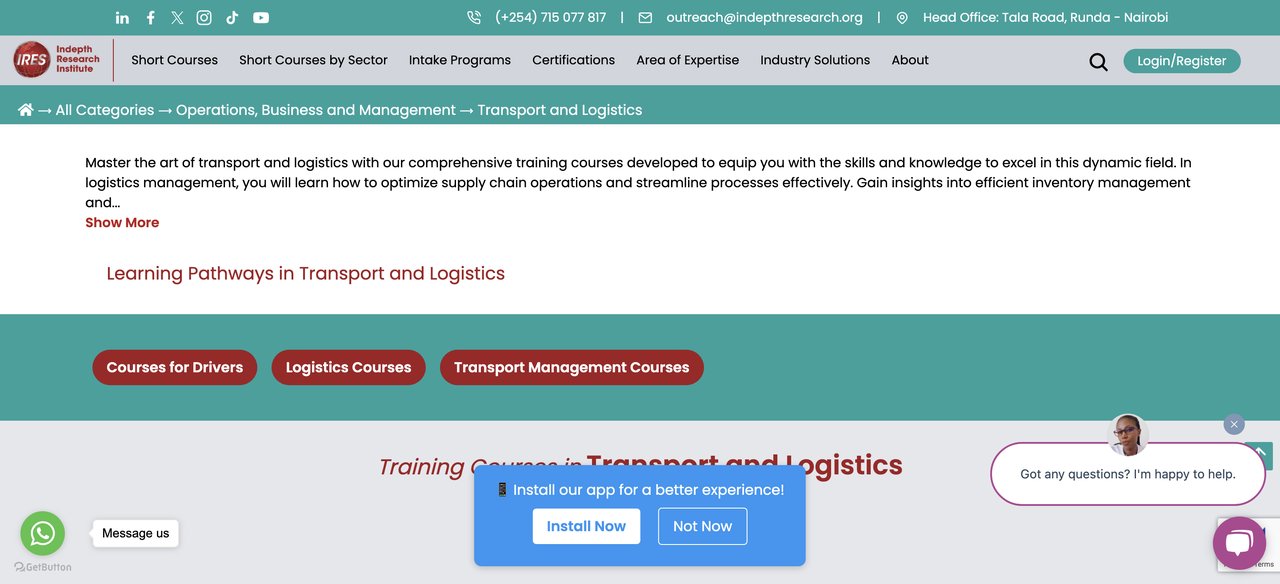
The CSCP certification provides a comprehensive overview of supply chain management, logistics strategies, and operational efficiency, including emerging technologies like AI and automation.
Key Topics Covered: Supply chain management, logistics strategies, AI and automation.
Target Audience and Skill Level Requirements: Professionals with some logistics experience seeking certification.
- Pros:
- Widely recognized certification.
- Comprehensive supply chain coverage.
- Cons:
- May require prior logistics experience.
- Cost varies by provider.
Who Would Benefit Most: Logistics professionals seeking a recognized certification to enhance career prospects.
Visit APICS/ASCM's CourseCourse 7: Certified in Logistics, Transportation, and Distribution (CLTD) by APICS/ASCM
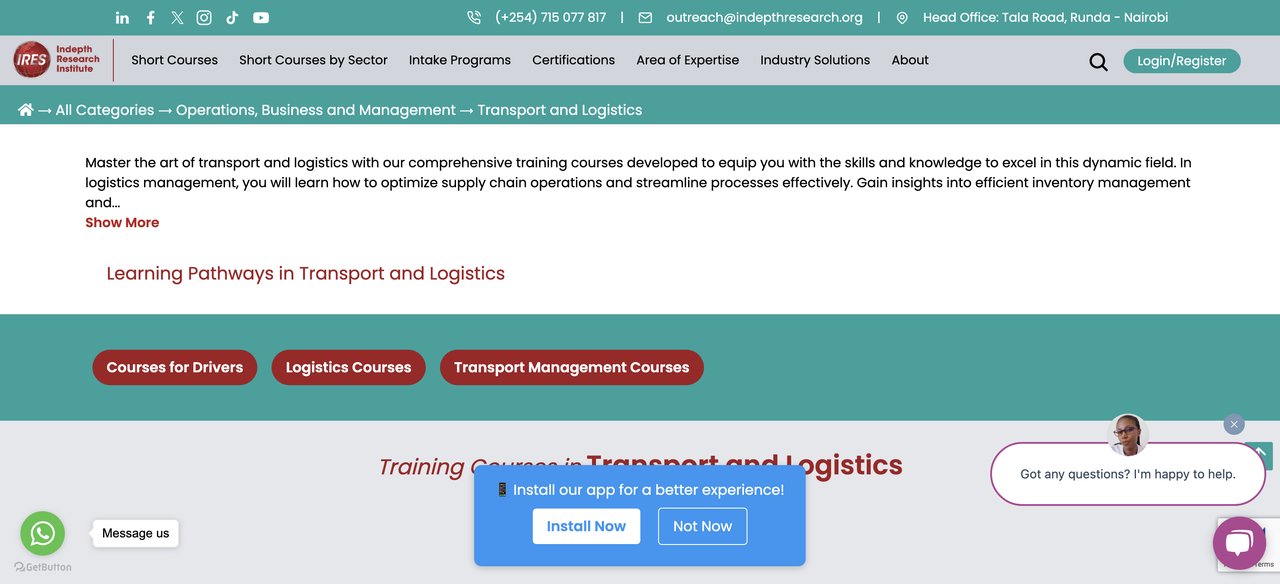
The CLTD certification is ideal for professionals in distribution, warehouse management, and freight operations, incorporating modern technologies including AI-driven logistics solutions.
Key Topics Covered: Logistics operations, AI-driven solutions, distribution management.
Target Audience and Skill Level Requirements: Professionals in logistics operations seeking specialized certification.
- Pros:
- Specialized focus on logistics operations.
- Globally recognized certification.
- Cons:
- Requires preparation and may be challenging for beginners.
Who Would Benefit Most: Those in logistics operations looking to specialize and gain certification.
Visit APICS/ASCM's CourseCourse 8: Specialized Courses in AI and Automation in Logistics by Various (Indepth Research Institute and partners)
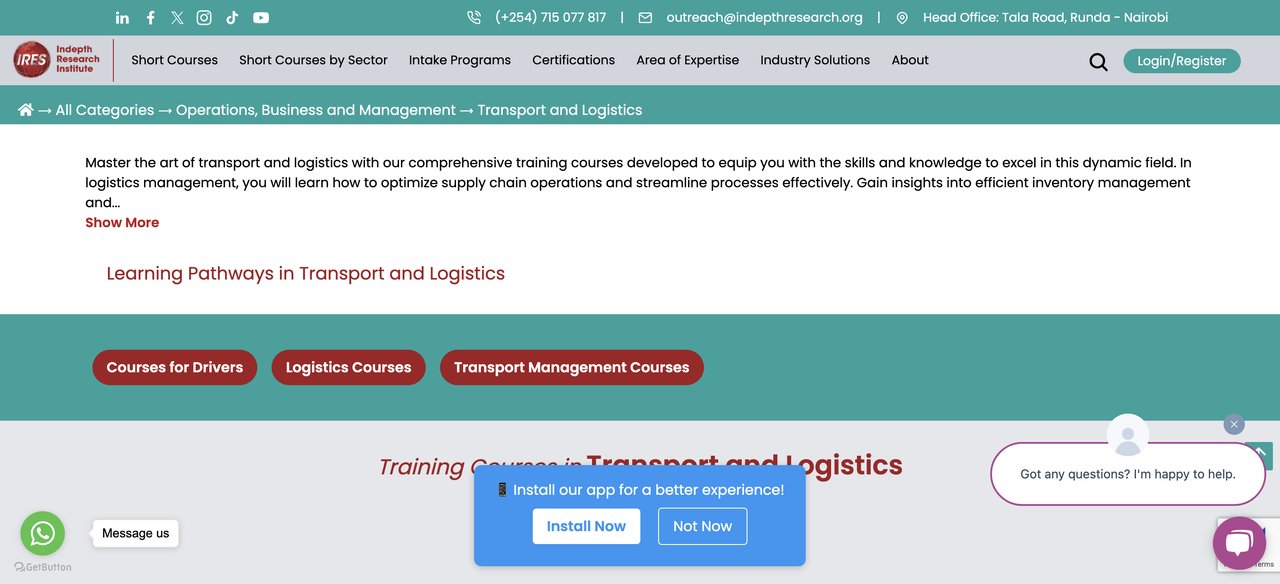
These courses cover AI-driven logistics and automation in warehouses, fleet management, and supply chain optimization, including topics like route optimization and predictive analytics.
Key Topics Covered: Route optimization, predictive analytics, automation technologies.
Target Audience and Skill Level Requirements: Logistics professionals seeking to prepare for future trends with a technical background.
- Pros:
- Prepares logistics engineers for future trends.
- Enhances operational efficiency.
- Cons:
- Course availability depends on provider.
- May require technical background.
Who Would Benefit Most: Professionals looking to understand the future of logistics with AI and automation.
Visit Indepth Research Institute's CoursesOverall Recommendations
Choosing the right AI course for logistics engineers depends on your specific career goals, current skill level, and learning preferences. For those who value continuous learning and staying updated with AI trends, CompleteAI Training offers a comprehensive, affordable subscription service. If you are looking for a formal academic approach, consider the FIU program for a deeper dive into applied AI in logistics.
For those seeking practical, hands-on applications, the Georgia Institute of Technology course provides a flexible hybrid learning experience. Finally, if certification is your goal, explore the offerings from APICS/ASCM for widely recognized credentials in the logistics field.




